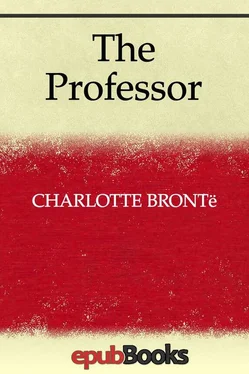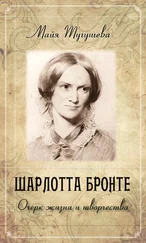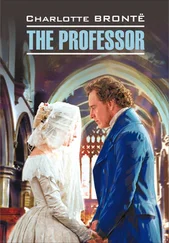Шарлотта Бронте - The Professor
Здесь есть возможность читать онлайн «Шарлотта Бронте - The Professor» — ознакомительный отрывок электронной книги совершенно бесплатно, а после прочтения отрывка купить полную версию. В некоторых случаях можно слушать аудио, скачать через торрент в формате fb2 и присутствует краткое содержание. Год выпуска: 2014, Издательство: epubBooks Classics, Жанр: Классическая проза, на английском языке. Описание произведения, (предисловие) а так же отзывы посетителей доступны на портале библиотеки ЛибКат.
- Название:The Professor
- Автор:
- Издательство:epubBooks Classics
- Жанр:
- Год:2014
- ISBN:нет данных
- Рейтинг книги:3 / 5. Голосов: 1
-
Избранное:Добавить в избранное
- Отзывы:
-
Ваша оценка:
- 60
- 1
- 2
- 3
- 4
- 5
The Professor: краткое содержание, описание и аннотация
Предлагаем к чтению аннотацию, описание, краткое содержание или предисловие (зависит от того, что написал сам автор книги «The Professor»). Если вы не нашли необходимую информацию о книге — напишите в комментариях, мы постараемся отыскать её.
The Professor — читать онлайн ознакомительный отрывок
Ниже представлен текст книги, разбитый по страницам. Система сохранения места последней прочитанной страницы, позволяет с удобством читать онлайн бесплатно книгу «The Professor», без необходимости каждый раз заново искать на чём Вы остановились. Поставьте закладку, и сможете в любой момент перейти на страницу, на которой закончили чтение.
Интервал:
Закладка:
I remarked that I hoped she would find me worthy of her good opinion; that if I knew myself, I was incapable of betraying any confidence reposed in me. "Du reste," said she, "the surveillance will be strictly attended to." And then she proceeded to discuss the subject of terms. She was very cautious, quite on her guard; she did not absolutely bargain, but she warily sounded me to find out what my expectations might be; and when she could not get me to name a sum, she reasoned and reasoned with a fluent yet quiet circumlocution of speech, and at last nailed me down to five hundred francs per annum—not too much, but I agreed. Before the negotiation was completed, it began to grow a little dusk. I did not hasten it, for I liked well enough to sit and hear her talk; I was amused with the sort of business talent she displayed. Edward could not have shown himself more practical, though he might have evinced more coarseness and urgency; and then she had so many reasons, so many explanations; and, after all, she succeeded in proving herself quite disinterested and even liberal. At last she concluded, she could say no more, because, as I acquiesced in all things, there was no further ground for the exercise of her parts of speech. I was obliged to rise. I would rather have sat a little longer; what had I to return to but my small empty room? And my eyes had a pleasure in looking at Mdlle. Reuter, especially now, when the twilight softened her features a little, and, in the doubtful dusk, I could fancy her forehead as open as it was really elevated, her mouth touched with turns of sweetness as well as defined in lines of sense. When I rose to go, I held out my hand, on purpose, though I knew it was contrary to the etiquette of foreign habits; she smiled, and said—
"Ah! c'est comme tous les Anglais," but gave me her hand very kindly.
"It is the privilege of my country, Mademoiselle," said I; "and, remember, I shall always claim it."
She laughed a little, quite good–naturedly, and with the sort of tranquillity obvious in all she did—a tranquillity which soothed and suited me singularly, at least I thought so that evening. Brussels seemed a very pleasant place to me when I got out again into the street, and it appeared as if some cheerful, eventful, upward–tending career were even then opening to me, on that selfsame mild, still April night. So impressionable a being is man, or at least such a man as I was in those days.
Chapter X.
NEXT day the morning hours seemed to pass very slowly at M. Pelet's; I wanted the afternoon to come that I might go again to the neighbouring pensionnat and give my first lesson within its pleasant precincts; for pleasant they appeared to me. At noon the hour of recreation arrived; at one o'clock we had lunch; this got on the time, and at last St. Gudule's deep bell, tolling slowly two, marked the moment for which I had been waiting.
At the foot of the narrow back–stairs that descended from my room, I met M. Pelet.
"Comme vous avez l'air rayonnant!" said he. "Je ne vous ai jamais vu aussi gai. Que s'est–il donc passe?"
"Apparemment que j'aime les changements," replied I.
"Ah! je comprends—c'est cela—soyez sage seulement. Vous etes bien jeune—trop jeune pour le role que vous allez jouer; il faut prendre garde—savez–vous?"
"Mais quel danger y a–t–il?"
"Je n'en sais rien—ne vous laissez pas aller a de vives impressions—voila tout."
I laughed: a sentiment of exquisite pleasure played over my nerves at the thought that "vives impressions" were likely to be created; it was the deadness, the sameness of life's daily ongoings that had hitherto been my bane; my blouse–clad "eleves" in the boys' seminary never stirred in me any "vives impressions" except it might be occasionally some of anger. I broke from M. Pelet, and as I strode down the passage he followed me with one of his laughs—a very French, rakish, mocking sound.
Again I stood at the neighbouring door, and soon was re–admitted into the cheerful passage with its clear dove–colour imitation marble walls. I followed the portress, and descending a step, and making a turn, I found myself in a sort of corridor; a side–door opened, Mdlle. Reuter's little figure, as graceful as it was plump, appeared. I could now see her dress in full daylight; a neat, simple mousseline–laine gown fitted her compact round shape to perfection—delicate little collar and manchettes of lace, trim Parisian brodequins showed her neck, wrists, and feet, to complete advantage; but how grave was her face as she came suddenly upon me! Solicitude and business were in her eye—on her forehead; she looked almost stern. Her "Bon jour, monsieur," was quite polite, but so orderly, so commonplace, it spread directly a cool, damp towel over my "vives impressions." The servant turned back when her mistress appeared, and I walked slowly along the corridor, side by side with Mdlle. Reuter.
"Monsieur will give a lesson in the first class to–day," said she; "dictation or reading will perhaps be the best thing to begin with, for those are the easiest forms of communicating instruction in a foreign language; and, at the first, a master naturally feels a little unsettled."
She was quite right, as I had found from experience; it only remained for me to acquiesce. We proceeded now in silence. The corridor terminated in a hall, large, lofty, and square; a glass door on one side showed within a long narrow refectory, with tables, an armoire, and two lamps; it was empty; large glass doors, in front, opened on the playground and garden; a broad staircase ascended spirally on the opposite side; the remaining wall showed a pair of great folding–doors, now closed, and admitting, doubtless, to the classes.
Mdlle. Reuter turned her eye laterally on me, to ascertain, probably, whether I was collected enough to be ushered into her sanctum sanctorum. I suppose she judged me to be in a tolerable state of self–government, for she opened the door, and I followed her through. A rustling sound of uprising greeted our entrance; without looking to the right or left, I walked straight up the lane between two sets of benches and desks, and took possession of the empty chair and isolated desk raised on an estrade, of one step high, so as to command one division; the other division being under the surveillance of a maitresse similarly elevated. At the back of the estrade, and attached to a moveable partition dividing this schoolroom from another beyond, was a large tableau of wood painted black and varnished; a thick crayon of white chalk lay on my desk for the convenience of elucidating any grammatical or verbal obscurity which might occur in my lessons by writing it upon the tableau; a wet sponge appeared beside the chalk, to enable me to efface the marks when they had served the purpose intended.
I carefully and deliberately made these observations before allowing myself to take one glance at the benches before me; having handled the crayon, looked back at the tableau, fingered the sponge in order to ascertain that it was in a right state of moisture, I found myself cool enough to admit of looking calmly up and gazing deliberately round me.
And first I observed that Mdlle. Reuter had already glided away, she was nowhere visible; a maitresse or teacher, the one who occupied the corresponding estrade to my own, alone remained to keep guard over me; she was a little in the shade, and, with my short sight, I could only see that she was of a thin bony figure and rather tallowy complexion, and that her attitude, as she sat, partook equally of listlessness and affectation. More obvious, more prominent, shone on by the full light of the large window, were the occupants of the benches just before me, of whom some were girls of fourteen, fifteen, sixteen, some young women from eighteen (as it appeared to me) up to twenty; the most modest attire, the simplest fashion of wearing the hair, were apparent in all; and good features, ruddy, blooming complexions, large and brilliant eyes, forms full, even to solidity, seemed to abound. I did not bear the first view like a stoic; I was dazzled, my eyes fell, and in a voice somewhat too low I murmured—
Читать дальшеИнтервал:
Закладка:
Похожие книги на «The Professor»
Представляем Вашему вниманию похожие книги на «The Professor» списком для выбора. Мы отобрали схожую по названию и смыслу литературу в надежде предоставить читателям больше вариантов отыскать новые, интересные, ещё непрочитанные произведения.
Обсуждение, отзывы о книге «The Professor» и просто собственные мнения читателей. Оставьте ваши комментарии, напишите, что Вы думаете о произведении, его смысле или главных героях. Укажите что конкретно понравилось, а что нет, и почему Вы так считаете.











